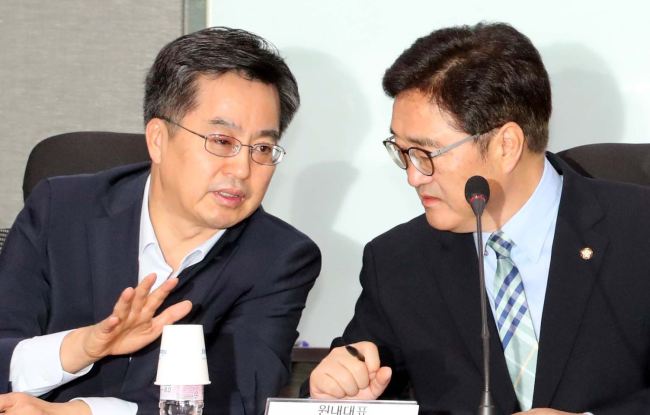The Moon Jae-in government and the ruling liberal Democratic Party of Korea on Thursday agreed that the incoming tax law revision should focus on creating jobs and supporting small businesses.
But the two sides failed to settle on how to raise extra tax from the rich. While the party viewed the hike as a crucial step to reform the nation’s economic inequality, the government remained reluctant to impose a direct burden on local businesses.
 |
Finance Minister and Deputy Prime Minister for economic affairs Kim Dong-yeon (left) speaks Thursday with the ruling Democratic Party`s floor leader Rep. Woo Won-shik during a government-ruling party consultation on the nation`s tax reform plan. (Yonhap) |
The Democratic Party and the Finance Ministry held a policy consultation meeting at the National Assembly in the morning, gearing up for the tax law revision bill which is to take shape by next Wednesday.
“The government came up with a solution to create good quaity jobs and to alleviate the tax burden for ordinary people and small business operators, and the party consented to the idea,” Rep. Kim Tae-nyeon, chief policymaker of the party, told reporters in a briefing.
The starting point will be to offer new tax benefits for businesses that create jobs and to expand tax deductions for those which improve the labor environment by turning temporary workers into regular employees or raising wages, Kim explained.
Support plans for self-employed businesses -- such as beneficial earned income tax credits and increased tax deductions -- are also being considered, he added.
The renewed tax regulations are to act as a key tool for President Moon’s state management vision, which vows to create jobs and to promote “economic justice.”
According to the administration’s state operation blueprint announced last week, an extra 178 trillion won ($160 billion) will be required over the next five years.
The government claimed that up to 95.4 trillion won of the amount could be set aside by rearranging spending but it that the remaining margin will have to come from a net increase in tax revenues.
It was, however, this apparently inevitable tax hike which raised backlash from the largely conservative opposition bloc, as well as from leading businesses that were already irked by the hourly minimum wage increase plan. Earlier this month, the nation’s legal minimum wage was raised by 16.4 percentage points to 7,530 won per hour for next year.
The ruling party has long been in support of raising the corporate tax rate and lowering the threshold to the top income tax bracket to 300 million won, but the Finance Ministry has remained wary of tax increases.
“One of the key directions of the government’s tax system reform is to expand finances,” Finance Minister and Deputy Prime Minister of Economic Affairs Kim Dong-yeon said in his opening statement.
Though his remark seemed to stand in line with the ruling party, the minister refrained from directly addressing tax hikes.
The ruling party’s floor leader Rep. Woo Won-shik, in contrast, underlined that the tax rate increase for corporations and the high-income group is not an unreasonable burden but an amendment of excessive tax benefits offered under the former conservative governments.
Responding pre-emptively to concerns on such government-party disagreement, the ruling party claimed that there has been a general consensus on the super-rich tax hike, though details are yet to be confirmed.
“We are content that the government fully understands President Moon’s and our stance (on the tax system reform),” Rep. Kim said.
He also asked for the media’s understanding that the final details of the tax revision are yet to be sorted out.
“I know that many of you were expecting more progress but the government will reflect today’s discussions in drawing up the revision bill, before announcing the final version next week.”
The government’s tax revision bill will be announced next Wednesday, after which it is to be submitted to the legislature. The ruling party hopes to have the bill on a general meeting vote during a regular parliamentary session which is to start in September, according to officials.
By Bae Hyun-jung (
tellme@heraldcorp.com)








![[Today’s K-pop] Blackpink’s Jennie, Lisa invited to Coachella as solo acts](http://res.heraldm.com/phpwas/restmb_idxmake.php?idx=644&simg=/content/image/2024/11/21/20241121050099_0.jpg)